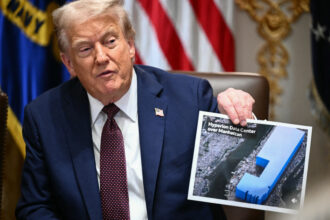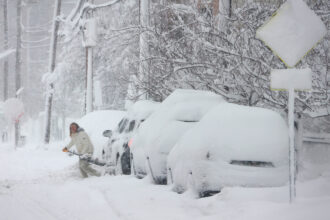In his inaugural address, President Obama promised to "restore science to its rightful place," and indeed, that idea has been a central theme of his transition. With his various appointments, he has surrounded himself with the best scientific minds in the nation. Trouble is, his interim target for capping emissions — down to 1990 levels by 2020 — falls short of what science recommends.
It was a promise he made on the campaign trail, and it may be the first promise he breaks — by exceeding it. At least that’s the hope, now that the target has conveniently disappeared from the list of goals posted in the Energy and the Environment section on the White House web site. Alden Meyer, the director of policy and strategy for the Union of Concerned Scientists who noted the web site change, remarked that "the first step in revising one’s position is to stop restating it."
There is pressure building on Obama to do so. Joe Romm presented the case in a paper called The U.S. needs a tougher 2020 GHG emissions target published by the Center for American Progress a week before the inauguration. In his first remarks as chair of the House Energy and Commerce Committee last week, Henry Waxman made it clear that he intended to develop climate legislation by Memorial Day consistent with the science. And the world’s chief climate scientist — Rajendra Pachauri of the IPCC — the man whose institution shared the Nobel Prize with Al Gore — last week told a gathering at the WorldWatch Institute in Washington that the President’s target was not enough. (See video at 55:20.)
I’d like to see him revise the statement that he made about stabilizing emissions — bringing them down to the level of 1990 by 2020.
I’d like him to suggest something akin to what the European Union has set itself as a target: the 20-20-20 target — because I think that really shows a level of seriousness in meeting this challenge which I think is also consistent with the position he’s been taking.
Europe by 2020 is going to reduce emission 20% [below] 1990 levels and also source 20% of its electricty from renewables.
Earlier in his remarks, Dr. Pachauri also made a business case for US leadership on climate action (at 30:18).
I believe it is very important for the US to lead and to get engaged in the whole process of mitigating greenhouse gas emissions because otherwise we won’t reach global stabilization targets.
And I think U.S. industry — if it relly knows what’s good for it — will have to be part of this effort because otherwise the rest of the world will move to carbon products.
We’ve seen that in General Motors where the saying was "what’s good for General Motors is good for America." Well, General Motors is going bankrupt and I hope that doesn’t happen to America. Other automobile manufacturers had the wisdom and the vision to be able to move ahead wih new technology.
I think it is important for the U.S. to lead.
Stay tuned.
About This Story
Perhaps you noticed: This story, like all the news we publish, is free to read. That’s because Inside Climate News is a 501c3 nonprofit organization. We do not charge a subscription fee, lock our news behind a paywall, or clutter our website with ads. We make our news on climate and the environment freely available to you and anyone who wants it.
That’s not all. We also share our news for free with scores of other media organizations around the country. Many of them can’t afford to do environmental journalism of their own. We’ve built bureaus from coast to coast to report local stories, collaborate with local newsrooms and co-publish articles so that this vital work is shared as widely as possible.
Two of us launched ICN in 2007. Six years later we earned a Pulitzer Prize for National Reporting, and now we run the oldest and largest dedicated climate newsroom in the nation. We tell the story in all its complexity. We hold polluters accountable. We expose environmental injustice. We debunk misinformation. We scrutinize solutions and inspire action.
Donations from readers like you fund every aspect of what we do. If you don’t already, will you support our ongoing work, our reporting on the biggest crisis facing our planet, and help us reach even more readers in more places?
Please take a moment to make a tax-deductible donation. Every one of them makes a difference.
Thank you,











